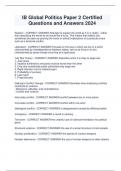Exam (elaborations)
CBT Basic Principles of Cognitive-Behavior Therapy 100% Accurate
- Course
- Institution
COGNITIVE-BEHAVIOR THERAPY (CBT) - ANSWER --Is based on a set of well-developed principles that are used to formulate treatment plans and guide the actions of the therapist. CBT is a commonsense approach that is based on two central tenets - ANSWER 1. Our cognitions have a controlling influence ...
[Show more]




